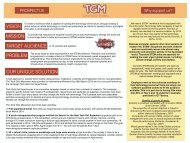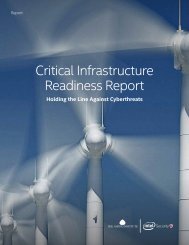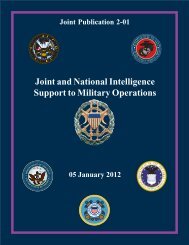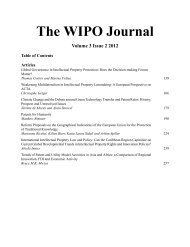Transparency Initiative (EITI)
2eoch1l
2eoch1l
Create successful ePaper yourself
Turn your PDF publications into a flip-book with our unique Google optimized e-Paper software.
52 Macro Data: Global Statistical Analysis<br />
The statistical analysis is based on a selection of World Development<br />
Indicators (WDI) for both dependent and independent<br />
intervening variables, which are regularly compiled<br />
and published by the World Bank and <strong>EITI</strong> data on<br />
country candidature and membership (as the independent<br />
variables of interest), as published on its website.<br />
Furthermore, the following datasets were considered to be<br />
included:<br />
``<br />
``<br />
``<br />
``<br />
``<br />
Corruption Perceptions Index (CPI)<br />
Resource Governance Index (NRGI)<br />
Bertelsmann Transformation Index (BTI)<br />
International Center for Tax and Development – ICTD<br />
(Sussex) database on public revenue<br />
Public Expenditure and Financial Accountability (PEFA)<br />
Program<br />
4. Foreign direct investments (net inflows) in percentage<br />
of GDP<br />
5. Informal payments to public officials: Informal payments<br />
to public officials are the percentage of firms expected<br />
to make informal payments to public officials to<br />
"get things done" with regard to customs, taxes, licenses,<br />
regulations, services, and the like.<br />
6. Time to prepare and pay taxes<br />
7. Tax revenues in percentage of GDP<br />
World Bank Country Policy and Institutional Assessments<br />
(CPIA) for (all indexes range from 1 = low to 6 = high):<br />
8. Business regulatory environment<br />
However, due to either<br />
9. Equity of public resource use rating<br />
``<br />
``<br />
``<br />
too many missing values for the 51 <strong>EITI</strong> countries and<br />
the sample of 98 countries, and/or<br />
the need to cover a time period of at least 10 years for<br />
the regression model, and<br />
in some cases, like PEFA, outdated data (e.g. for Afghanistan<br />
most recent data from 2008)<br />
those options needed to be discarded.<br />
10. Fiscal policy rating<br />
11. Quality of public administration rating<br />
12. Trade rating<br />
13. <strong>Transparency</strong>, accountability and corruption rating<br />
Eventually, a total of 13 variables from the World Bank database<br />
were analyzed, which were considered as potentially<br />
depending on a country’s <strong>EITI</strong> candidature or membership<br />
status. All definitions are taken from the World Bank<br />
(http://data.worldbank.org/indicator):<br />
1. Bribery incidence: Bribery incidence is the percentage<br />
of firms experiencing at least one bribe payment request<br />
across 6 public transactions dealing with utilities<br />
access, permits, licenses, and taxes.<br />
2. Business extent of disclosure index: Disclosure index<br />
measures the extent to which investors are protected<br />
through disclosure of ownership and financial information.<br />
The index ranges from 0 to 10, with higher values<br />
indicating more disclosure.<br />
3. Discrepancy in expenditure estimate of GDP in local<br />
currency units<br />
Unfortunately, as for some of the independent variables also<br />
for three of the assumed dependent variables, i.e. bribery<br />
incidence, tax revenues and informal payments to public<br />
officials, the database was too fragmented to provide<br />
meaningful results. For reasons of limitations of data sources,<br />
major explanatory variables are not included in the<br />
model.<br />
As a complement to GDP as an outcome variable, an alternative<br />
wealth and well-being measurement such as the<br />
Genuine Progress Indicator (GPI) would be desirable, if data<br />
is adequate. In addition to factoring in non-financial measures<br />
of societal and environmental aspects, GPI also assesses<br />
the depletion of natural resources as a factor in national<br />
wealth, which is especially relevant in light of the <strong>EITI</strong>’s<br />
focus on natural resource governance.<br />
As the following tables show, the key issue is the absence of<br />
significant results – and, of course, endogeneity. The results









